Low fees - No hidden fees - No setup or monthly fees.
Cryptocurrency Payment Gateway Fee
Helping You Make Smart Financial Decisions
In addition to its low fees and flexible pricing options, XaiGate also offers a number of other features that make it a valuable choice for businesses.
- 9.866+ Supported Coins
- No Monthly Cost
- Low fees
- No hidden fees
- Deposit is FREE
- Supported 3 Network
- 0.2% Transaction Fee
- Easy to Setup
- Security
- Instant settlements
- Global reach
- 24/7 customer support

Cryptocurrencies
Bitcoin (BTC)
Transaction fee
0.0001
Processing fee
0.2%
Ethereum (ETH)
0.003
0.2%
Bitcoin Cash (BCH)
0.01
0.2%
Binance Coin (BNB)
0.005
0.2%
DogeCoin (DOGE)
6
0.2%
Tether USD ERC20
3-6
0.2%
Tether USD TRC20
1-3
0.2%
Litecoin (LTC)
0.006
0.2%
Tron (TRX)
8
0.2%
Monero (XMR)
0.005
0.2%
Dash (DASH)
0.02
0.2%
Solana (SOL)
0.0001
0.2%
Ether Classic (ETC)
0.001
0.2%
Waves (WAVES)
0.001
0.2%
Ripple (XRP)
3
0.2%
NEM (XEM)
4
0.2%
Telos (TLOS)
0.3
0.2%
Qtum (QTUM)
0.015
0.2%
Crypto Payment Gateway Fee
Crypto Exchange Fees Calculator
Demystifying Crypto Fees with a Calculator
Trading in the volatile world of cryptocurrencies brings a thrill unmatched by traditional markets. However, alongside the potential for high returns lurks a hidden enemy: fees. Understanding and calculating these fees can make the difference between a profitable venture and a costly learning experience. This article serves as your guide, demystifying the intricacies of crypto fees and equipping you with the power of a crypto fee calculator.
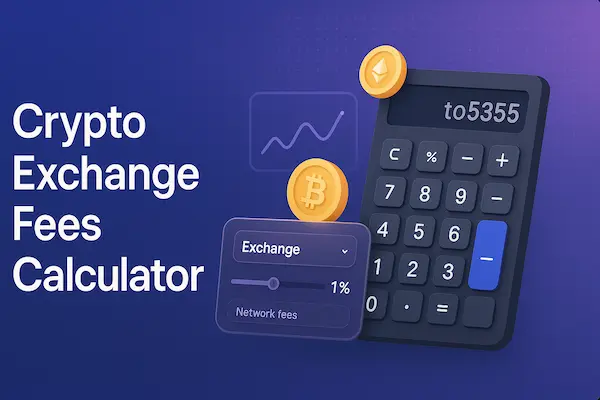
Types of Crypto Fees
The crypto landscape abounds with diverse fees, each with its own bite. Let’s dissect the most common ones:
- Trading fees: These are the primary charges levied on every buy and sell order. The fees can be a flat rate, a percentage of the trade value, or even a tiered system based on trading volume.
- Withdrawal fees: Moving your crypto from an exchange to a personal wallet incurs withdrawal fees. These fees vary depending on the network congestion and the chosen withdrawal method (faster networks typically charge more).
- Deposit fees: While some exchanges waive deposit fees, others charge a fixed amount or a percentage of the deposited amount. Be mindful of these charges, especially for smaller deposits.
- Maker/taker fees: These fees incentivize market liquidity. Makers are those who add orders to the order book, providing liquidity, while takers remove orders, taking liquidity. Typically, maker fees are lower than taker fees, encouraging order creation.
- Network fees: Blockchain transactions incur fees paid to miners or validators who maintain the network. These fees fluctuate based on network congestion and are independent of the exchange.
Crypto FEE Calculator
Cryptocurrency Fee Calculator and Crypto Fees Chart
Beyond the basic fees, several other factors can affect your overall cost:
- Spreads: The difference between the buy and sell price offered by an exchange can significantly impact your effective trading fees. Tight spreads minimize this cost.
- Payment methods: Funding your account or withdrawing funds using certain methods might incur additional fees. For example, credit card purchases often carry higher fees than bank transfers.
- Margin trading: Leveraged trading amplifies both profits and losses, and additional fees might be charged for borrowing the margin.
- Staking/lending: Earning interest on your crypto might involve fees for platform usage or pool management.
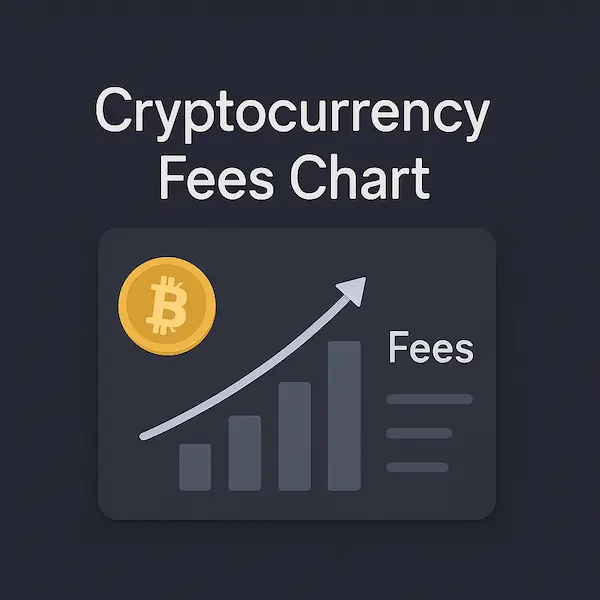
Navigating this complex web of fees can be daunting, but fear not! Enter the crypto fee calculator, your valiant steed in this financial quest. These online tools, offered by various platforms and exchanges, simplify the process by:
- Comparing fees across multiple exchanges: Enter your desired trade details (crypto pair, amount, exchange), and the calculator displays the estimated fees for each platform. This allows you to choose the most cost-effective option.
- Breaking down fee components: The calculator clearly shows the individual fees involved (trading, withdrawal, network) and their impact on your total cost.
- Accounting for additional factors: Some calculators can incorporate spreads, payment methods, and other variables to provide a more accurate fee estimate.
To wield the calculator effectively, remember these pointers:
- Choose a reputable calculator: Not all calculators are created equal. Seek one offered by a trusted platform or exchange with a reliable track record.
- Provide accurate information: Ensure you enter all relevant details, including the crypto pair, order type, and preferred payment method, for the most accurate estimate.
- Compare multiple options: Don’t rely on just one calculator. Compare results across different platforms to find the best deal.
- Understand the limitations: Calculators provide estimates, not guarantees. Real-time fees might fluctuate slightly.
- Use it as a guide, not a gospel: Ultimately, the calculator is a tool to inform your decision-making. Always consider other factors such as exchange reliability, security, and user experience before choosing a platform.
Cryptocurrency Fees Chart: Understanding Transaction Costs Across Different Blockchains
As the adoption of cryptocurrencies continues to grow, businesses and individuals are paying closer attention to the costs associated with using digital currencies. The Cryptocurrency Fees Chart provides a clear overview of transaction fees across various blockchain networks, helping users make informed decisions about which cryptocurrency to use for payments, transfers, or investments. Transaction fees are a critical factor to consider, as they can impact the overall cost-effectiveness and speed of transactions, especially for businesses processing high volumes of payments.
Why Do Cryptocurrency Fees Vary?
Transaction fees in cryptocurrency networks, also known as “gas fees” or “network fees,” vary based on several factors:
Blockchain Traffic: The more congested a blockchain network is, the higher the fees. For example, during periods of high demand on the Bitcoin or Ethereum networks, fees can surge significantly as users compete to have their transactions processed quickly.
Transaction Complexity: Some transactions require more computational power to process. For instance, smart contracts on the Ethereum network involve more complex operations compared to a simple transfer of funds, which can lead to higher fees.
Block Size: Each blockchain has a specific block size limit that determines how many transactions can be included in a block. If the block size is full, users may need to pay higher fees to prioritize their transaction for faster processing.
Token vs. Native Coin: Some blockchain networks charge higher fees for transferring tokens compared to their native coins. For example, transferring ERC-20 tokens on the Ethereum network usually incurs higher fees than sending ETH (Ethereum’s native coin).
Understanding these factors can help users manage their transactions more efficiently, whether they are sending funds, paying for goods, or using crypto in business transactions.
How to Use the Cryptocurrency Fees Chart
The Cryptocurrency Fees Chart is a valuable tool for comparing transaction costs across different blockchain networks. Here’s how you can leverage the chart:
Compare Popular Cryptocurrencies: Whether you are using Bitcoin, Ethereum, Litecoin, or newer cryptocurrencies like Solana or Cardano, the chart provides real-time information on average transaction fees for each network. This allows users to choose the most cost-effective cryptocurrency based on their needs.
Understand Fee Trends: Fees fluctuate over time due to changes in network activity. The Cryptocurrency Fees Chart allows users to track these trends, helping them decide the best times to initiate transactions to avoid high fees.
Optimize Business Payments: For businesses accepting cryptocurrency payments, understanding fee structures is essential for cost management. By using the chart, merchants can choose the cryptocurrencies that offer the lowest fees, maximizing their profit margins and improving the customer experience with faster and more affordable payment options.
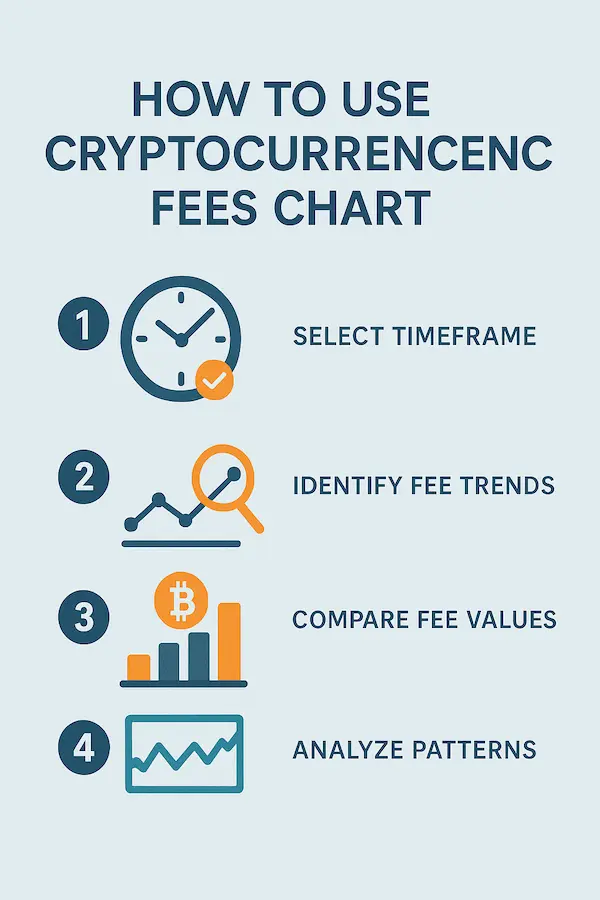
Examples of Cryptocurrency Fees (as of 2025)
Below is a side-by-side comparison of typical transaction fees across leading blockchain networks, providing a clearer view of current market dynamics.
Bitcoin (BTC): Bitcoin fees are known to fluctuate greatly depending on network congestion. Typically, Bitcoin transaction fees can range from $1 to $10, but during high demand, these fees can surge higher.
Ethereum (ETH): Ethereum is known for its higher transaction fees, especially when using the network for decentralized finance (DeFi) applications or transferring ERC-20 tokens. Fees can range from $5 to $50 depending on traffic.
Litecoin (LTC): As a faster and more affordable alternative to Bitcoin, Litecoin’s transaction fees are generally much lower, averaging around $0.01 to $0.10 per transaction.
Solana (SOL): Solana offers one of the lowest fees, averaging less than $0.01 per transaction due to its high-speed and scalable network architecture.
Cardano (ADA): Cardano fees are also relatively low, typically ranging between $0.10 to $0.20, making it an attractive option for those looking for affordable transactions.
These are just a few examples, and the Cryptocurrency Fees Chart allows for real-time updates on dozens of popular and emerging cryptocurrencies, helping users keep up with changing fee structures.
How to Reduce Cryptocurrency Transaction Fees
For users and businesses alike, reducing cryptocurrency transaction fees can lead to significant cost savings. Here are a few strategies:
Choose Off-Peak Times: Fees are often lower during periods of low network activity. By timing your transactions during off-peak hours, such as late at night or on weekends, you may be able to save on fees.
Use Layer 2 Solutions: Some blockchain networks, like Ethereum, offer Layer 2 scaling solutions such as Optimism or Arbitrum. These solutions allow users to make transactions on a secondary layer of the blockchain with significantly lower fees, while still benefiting from the security of the main network.
Select Lower-Cost Cryptocurrencies: As highlighted in the Cryptocurrency Fees Chart, some cryptocurrencies offer much lower fees than others. For example, using Solana or Cardano for transactions can be much cheaper than Bitcoin or Ethereum during peak times.
Consolidate Transactions: If possible, consolidating multiple transactions into one can help reduce the overall fees. For example, businesses processing large volumes of payments can batch them into a single transaction to minimize costs.
Comparison Table: Typical Transaction Fees (USD) by Blockchain Network
| Blockchain Network | Coin | Typical Fee (USD) | Notes |
|---|---|---|---|
| Bitcoin | BTC | $1 – $10 | Varies with congestion |
| Ethereum | ETH | $5 – $50 | High during DeFi/tokens |
| Bitcoin Cash | BCH | ~$0.005 – $0.01 | Large blocks → near-zero fees (BitInfoCharts, Wikipedia) |
| Litecoin | LTC | $0.005 – $0.10 | Efficient network, low fees |
| Solana | SOL | < $0.01 | Blazing-fast, ultra-low cost |
| Cardano | ADA | $0.10 – $0.20 | Moderate, suitable for general usage |
| Dogecoin | DOGE | Very low, ~3 ¢ on average (CryptoDnes.bg, Bitget, Bitrabo) | |
| Tether (USDT) | USDT (ERC‑20) | ~$2–$8 per withdrawal | Network and USDT variant dependent |
| Tether (USDT) | USDT (TRC‑20) | ~$1 | Via Tron, very cheap transfer |
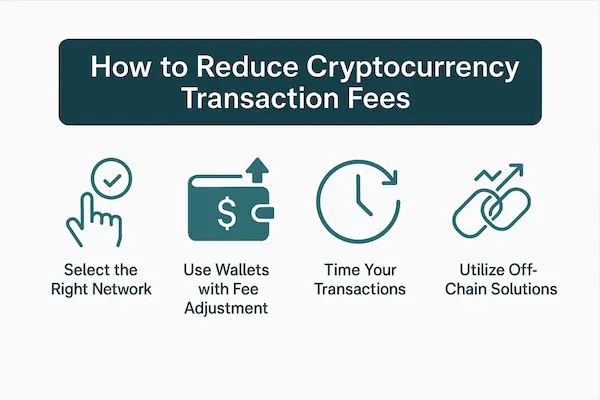
Why Cryptocurrency Fees Matter for Businesses
For businesses that accept cryptocurrency payments, understanding transaction fees is crucial for maintaining profitability. High fees can eat into margins, particularly for smaller transactions. By using the Cryptocurrency Fees Chart, businesses can identify which cryptocurrencies offer the best balance of cost and efficiency. This allows merchants to optimize their payment process, offering customers faster and more affordable options while keeping operational costs low.
In addition, monitoring transaction fees is important for businesses that deal with international customers. Cryptocurrencies offer a more cost-effective alternative to traditional banking systems, which often involve high fees and long processing times for cross-border payments. By choosing cryptocurrencies with lower transaction fees, businesses can improve their cash flow and provide a smoother payment experience for their global customer base.
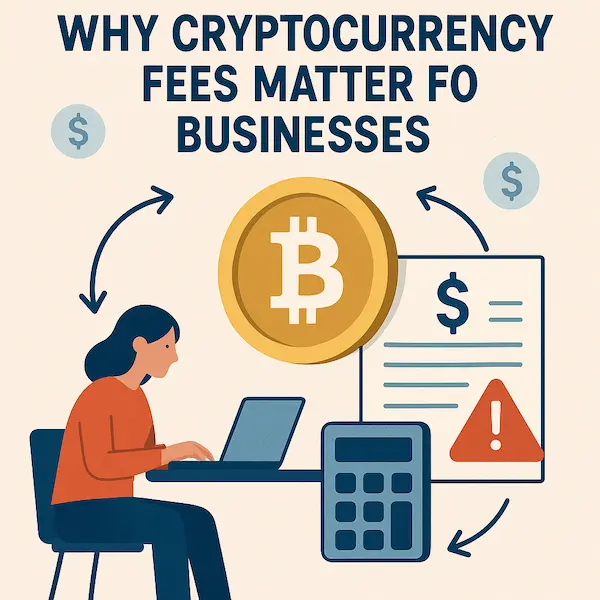
Stay Informed with the Cryptocurrency Fees Chart
At XAIGATE, we understand that crypto transaction fees can be unpredictable — they change minute by minute depending on network congestion, protocol updates, and even market hype. Whether you’re transferring funds, trading tokens, or bridging assets across chains, knowing the cost ahead of time matters.
That’s why we created the Cryptocurrency Fees Chart — a living reference point to help you:
Compare average fees across major blockchains like Bitcoin, Ethereum, Solana, Dogecoin, and more.
Track the difference between token variants — like USDT on ERC‑20 vs. TRC‑20 — so you don’t end up overpaying.
Identify low-fee networks that are ideal for micro-transactions or frequent usage, such as Litecoin or BCH.
We regularly update the data using a combination of blockchain explorer insights, exchange feeds, and network monitors, so the chart reflects what users are actually paying — not just theoretical estimates.
Our goal is simple: help you make smarter, more cost-effective choices every time you move your crypto. No fluff. Just numbers that make a difference.
Frequently Asked Questions (FAQs) – Cryptocurrency Fees Chart
1. What is a cryptocurrency fees chart?
A cryptocurrency fees chart shows the real-time cost of sending crypto across different blockchains. It helps you compare network fees like gas on Ethereum or low-cost fees on Solana or Tron.
2. Why do blockchain fees vary so much between coins?
Fees depend on network congestion, transaction speed, and the blockchain’s design. Ethereum tends to cost more due to smart contracts, while Solana and Tron offer faster, cheaper transactions.
3. What fees are included in XAIGATE’s fee chart?
The chart displays two fees:
– Network fee (paid to miners or validators)
– Processing fee (flat 0.2% charged by XAIGATE)
There are no monthly or hidden costs.
4. Are there hidden charges when sending crypto through XAIGATE?
No. XAIGATE charges only 0.2% processing fee plus the actual blockchain network fee. No setup costs, subscriptions, or surprise charges apply.
5. How can businesses use the chart to lower crypto payment fees?
By checking the chart, merchants can choose low-fee coins like USDT-TRC20 or SOL, and time transactions during less congested periods for maximum savings.
6. Is the cryptocurrency fee data updated in real time?
Yes. The chart pulls live data from blockchain explorers like Etherscan, TRON or Solscan, so you always see the current network fees before making a transaction.
7. Can I estimate the total cost before sending crypto?
Yes. Use XAIGATE’s fee calculator to enter the amount, coin, and network. It shows both the blockchain fee and processing fee before you confirm.
8. Why does fee transparency matter for online stores?
Clear fee breakdowns boost customer trust and help reduce cart abandonment. Knowing the costs upfront improves conversion rates for crypto checkouts.
9. What are the cheapest cryptocurrencies for payments in 2025?
The lowest-fee networks include:
– Solana (SOL): Fast and under $0.01
– Tron (USDT-TRC20): Near-zero fees
– Litecoin (LTC): Reliable and cheap
– Polygon (MATIC): Great for smart contracts
10. How can I reduce crypto fees for my business?
Use multi-coin checkout, enable Layer-2 options like Arbitrum, and route payments based on real-time network fees. XAIGATE’s system helps automate all of this.
Get Started with XAIGATE’s Cryptocurrency Payment Solutions
Secure crypto payment gateway provides a comprehensive cryptocurrency payment gateway that helps businesses manage fees and optimize their crypto transactions. With real-time access to the Cryptocurrency Fees Chart, you can stay ahead of the curve and ensure that your payments are processed efficiently and affordably. Start leveraging the power of cryptocurrency payments today with XAIGATE’s advanced solutions.
Understanding and tracking cryptocurrency transaction fees is essential for anyone actively participating in the blockchain ecosystem. The Cryptocurrency Fees Chart provides a real-time, side-by-side comparison of transaction costs across major networks such as Bitcoin, Ethereum, Litecoin, Solana, Solana, and Cardano — empowering users to make cost-effective and timely decisions.
Whether you’re a retail investor, a developer building dApps, or an e-commerce business accepting crypto payments, knowing which network offers the lowest fees and fastest confirmations can lead to significant cost savings and improved user experience.
As transaction fees continue to fluctuate with network activity, tools like this chart offer valuable transparency and financial control. Make it part of your crypto payment strategy to optimize every transaction and stay competitive in a fast-evolving digital economy.
For businesses, especially those in cross-border e-commerce, integrating blockchain-based payments with fee awareness can deliver lower operational costs, faster settlements, and a more seamless payment experience — all key to success in the Web3 era.



